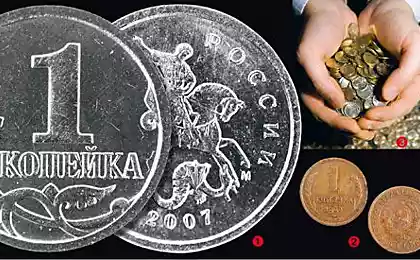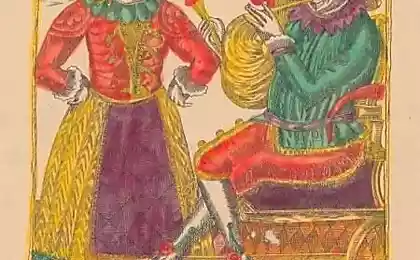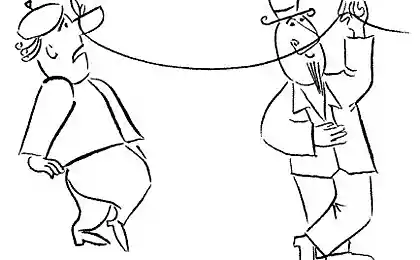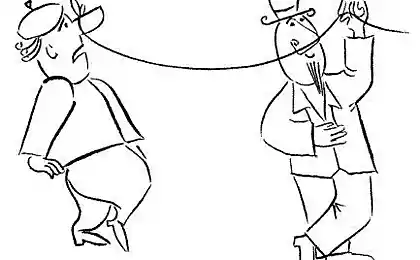975
The history of the expressions and proverbs
The expression "Balzac Age" emerged after the Balzac novel "The Thirty Years 'woman' and admissible against women no older than 40 years.
The phrase "A healthy body - healthy spirit" was originally taken from the Roman writer Juvenal satire and sounded like this: "We must pray to the gods, that was the spirit of a healthy body healthy." It is believed that the basis of this line is known in ancient Rome, saying: "mens sana in corpore sano - a rare phenomenon».
Breakfast Buffet Swedes themselves are called snack or sandwich. The term referred to in the Swedish wall bars, translated as "frame with slats." Nothing is known in this country and the Swedish family - the belief that the Swedes are much more likely other people are practicing joint cohabitation of two or more couples, is a fallacy.
The expression "Chinese puzzle" corresponds to the English idiom 'It is Greek to me'. Similar expressions exist in other languages, often with other standards difficult. For example, the German expression appeals to Spanish, Romanian - the Turkish, the Turkish - the French and the Chinese - to the bird language.
The phrase "Elementary, my dear Watson!", Which we used to associate with Sherlock Holmes, never found in the original Conan Doyle books.
Queen Elizabeth in 1746 ordered to brand the foreheads of criminals. From here are the origin of many popular expressions "written on my forehead," "denounce" and "seasoned web culprit».
Tyutelka - a diminutive of dialect Sissy ("hit, hit"), the name of the exact hit with an ax in the same place at the carpentry work. Today, to indicate precision used the phrase "on the nose».
Most experienced and strong Burlacu, going to the first strap, called bump. It turned into an expression of "big shot" to refer to an important person.
Earlier Friday was a free day from work and, as a consequence, market. On Friday, receiving goods, promised the next market day relying give him money. Since then, to refer to people who do not fulfill the promise, saying: "He has seven Fridays in the week».
Previously, in addition to the nose of the person named tag worn with them and that puts notches for accounting work, debt, etc. With this came the expression "hack to death on your nose." In another sense the nose called bribe offering. The expression "to remain with the nose 'meant to leave an offering of inaction, not agreeing.
The possessive adjective "cowboy" was formed from the dialect Sharani ("scum, rabble, swindlers"). The expression "cowboy firm" first meant literally "the establishment, the organization of crooks, liars," and today is used to refer to a disreputable office.
After the discovery of the ancient physicians nerves in the human body, they called them by similarity with the strings of musical instruments with the same word - nervus. Hence arose the expression for the irritant effect - "to play on the nerves».
In French "aset" - this dish, and mood state. Presumably, an erroneous translation of the French expression was the cause of phraseologism "at ease».
According to Christian tradition, the man who had long to live, the priest confessed, communion and censers of incense. As a result, to refer to the disease a person or barely working devices fixed to the expression "moribund».
According to the beliefs of some people, every unrepentant sinner, if over it gravitates curse after death comes from the grave as a vampire, vampire, vampire and destroys people. To remove the curse, it is necessary to dig up the remains of the deceased and rinse with clean water preserved bones. Today, the term "wash up bones" refers to the analysis of a person's character.
According to the gospel legend, Pontius Pilate, who was forced to agree to the execution of Jesus, washed his hands before the crowd and said, "I am innocent of this man's blood." Hence the expression to absolve themselves of responsibility, "I wash my hands».
According to the Hebrew rite, on the day of the remission of sins the high priest laid his hands on the head of a goat and thereby laid on him the sins of the people. Hence the expression «scapegoat».
One day, a young doctor, who was invited to the Russian hopelessly ill boy, let him have what he wants. The boy ate pork with cabbage and, to the surprise of others, began to recover. After that incident the doctor ordered pork with sauerkraut German boy sick, but he had eaten, died the next day. According to one version, this story is the basis of the appearance of the phrase "that Russian well, the Germans - death».
Monetarium [1] - personal growth, success, business

The phrase "A healthy body - healthy spirit" was originally taken from the Roman writer Juvenal satire and sounded like this: "We must pray to the gods, that was the spirit of a healthy body healthy." It is believed that the basis of this line is known in ancient Rome, saying: "mens sana in corpore sano - a rare phenomenon».
Breakfast Buffet Swedes themselves are called snack or sandwich. The term referred to in the Swedish wall bars, translated as "frame with slats." Nothing is known in this country and the Swedish family - the belief that the Swedes are much more likely other people are practicing joint cohabitation of two or more couples, is a fallacy.
The expression "Chinese puzzle" corresponds to the English idiom 'It is Greek to me'. Similar expressions exist in other languages, often with other standards difficult. For example, the German expression appeals to Spanish, Romanian - the Turkish, the Turkish - the French and the Chinese - to the bird language.
The phrase "Elementary, my dear Watson!", Which we used to associate with Sherlock Holmes, never found in the original Conan Doyle books.
Queen Elizabeth in 1746 ordered to brand the foreheads of criminals. From here are the origin of many popular expressions "written on my forehead," "denounce" and "seasoned web culprit».
Tyutelka - a diminutive of dialect Sissy ("hit, hit"), the name of the exact hit with an ax in the same place at the carpentry work. Today, to indicate precision used the phrase "on the nose».
Most experienced and strong Burlacu, going to the first strap, called bump. It turned into an expression of "big shot" to refer to an important person.
Earlier Friday was a free day from work and, as a consequence, market. On Friday, receiving goods, promised the next market day relying give him money. Since then, to refer to people who do not fulfill the promise, saying: "He has seven Fridays in the week».
Previously, in addition to the nose of the person named tag worn with them and that puts notches for accounting work, debt, etc. With this came the expression "hack to death on your nose." In another sense the nose called bribe offering. The expression "to remain with the nose 'meant to leave an offering of inaction, not agreeing.
The possessive adjective "cowboy" was formed from the dialect Sharani ("scum, rabble, swindlers"). The expression "cowboy firm" first meant literally "the establishment, the organization of crooks, liars," and today is used to refer to a disreputable office.
After the discovery of the ancient physicians nerves in the human body, they called them by similarity with the strings of musical instruments with the same word - nervus. Hence arose the expression for the irritant effect - "to play on the nerves».
In French "aset" - this dish, and mood state. Presumably, an erroneous translation of the French expression was the cause of phraseologism "at ease».
According to Christian tradition, the man who had long to live, the priest confessed, communion and censers of incense. As a result, to refer to the disease a person or barely working devices fixed to the expression "moribund».
According to the beliefs of some people, every unrepentant sinner, if over it gravitates curse after death comes from the grave as a vampire, vampire, vampire and destroys people. To remove the curse, it is necessary to dig up the remains of the deceased and rinse with clean water preserved bones. Today, the term "wash up bones" refers to the analysis of a person's character.
According to the gospel legend, Pontius Pilate, who was forced to agree to the execution of Jesus, washed his hands before the crowd and said, "I am innocent of this man's blood." Hence the expression to absolve themselves of responsibility, "I wash my hands».
According to the Hebrew rite, on the day of the remission of sins the high priest laid his hands on the head of a goat and thereby laid on him the sins of the people. Hence the expression «scapegoat».
One day, a young doctor, who was invited to the Russian hopelessly ill boy, let him have what he wants. The boy ate pork with cabbage and, to the surprise of others, began to recover. After that incident the doctor ordered pork with sauerkraut German boy sick, but he had eaten, died the next day. According to one version, this story is the basis of the appearance of the phrase "that Russian well, the Germans - death».
Monetarium [1] - personal growth, success, business
























